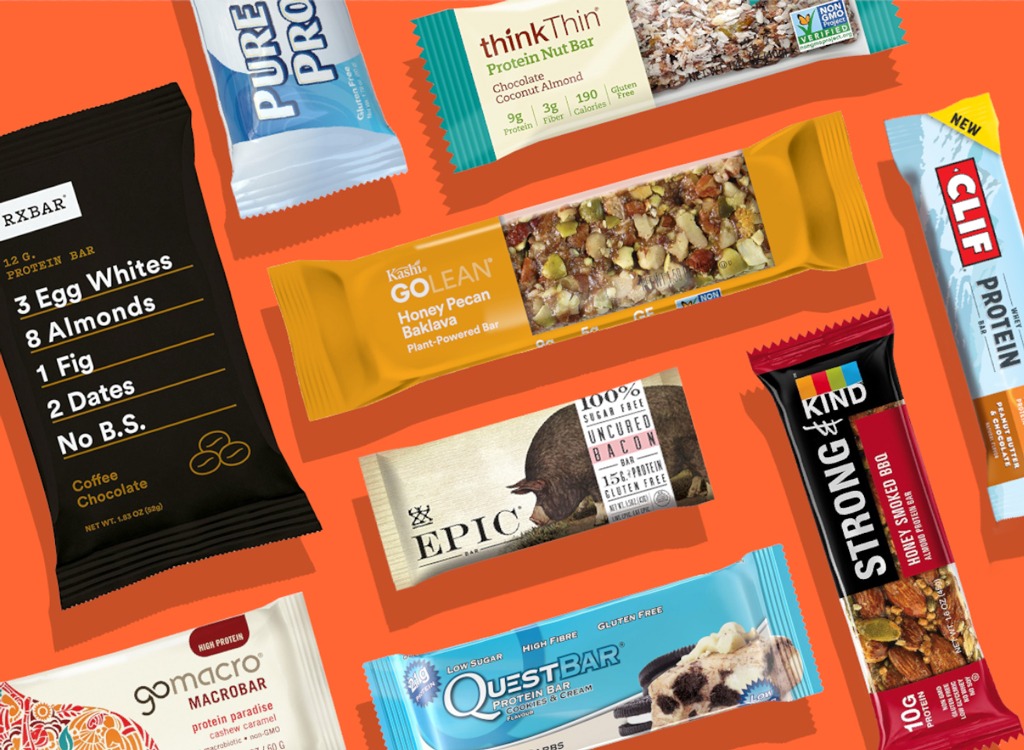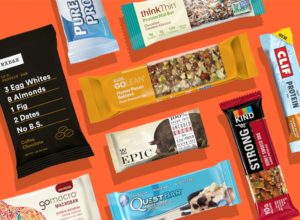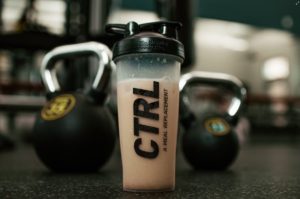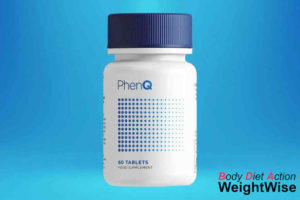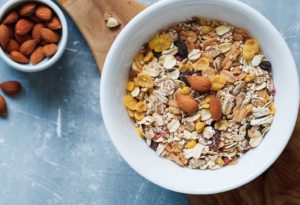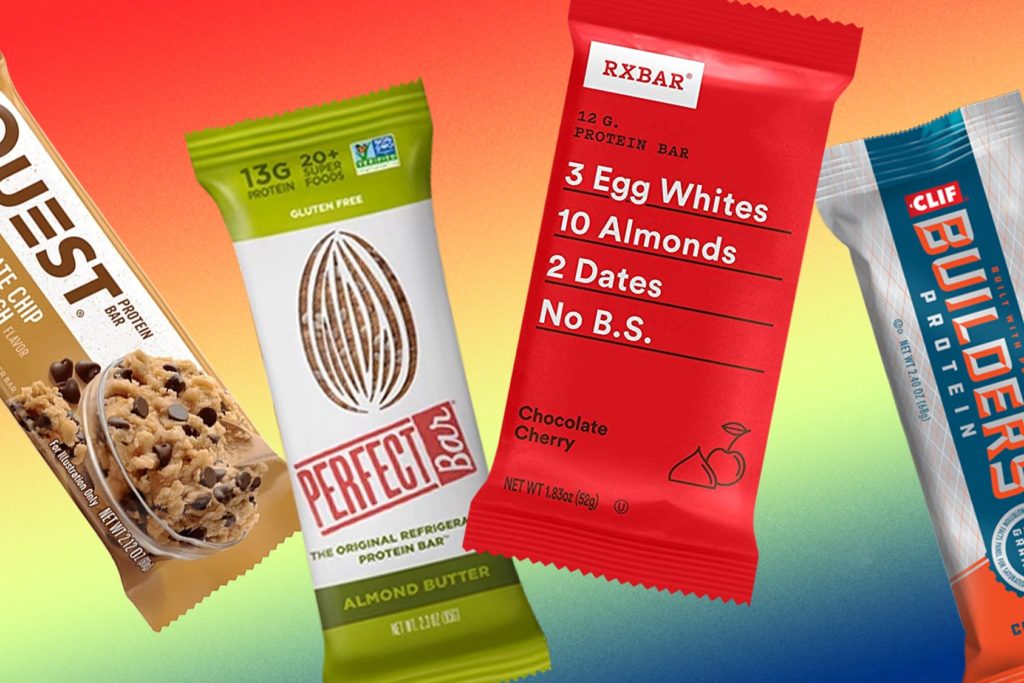 Protein bars are one of several “clean” snack items we are seeing more and more of lately. They are advertised as food that people shouldn’t feel guilty about eating when they’re trying to lose weight.
Protein bars are one of several “clean” snack items we are seeing more and more of lately. They are advertised as food that people shouldn’t feel guilty about eating when they’re trying to lose weight.
But are protein bars good for weight loss? It seems the tastes and components in several of these snack bars aren’t dissimilar from chocolate bars, which we know don’t help with weight loss.
Protein bars are intended to provide a quick supply of nourishment. They’re popular because they provide a simple way of adding proteins and other vitamins to demanding lifestyles.
There are many, many kinds of protein bars available for sale. Not all protein bars are created equal, however. Read on to learn more about protein bars and how best to include them in your daily diet.
Protein Bars: What Are They Exactly?
Protein bars are quick, portable, tasty snacks and are a healthier substitute for other quick snacks. Protein bars are high in protein and fiber rather than the carbohydrates and processed sugars found in most candy bars or even ‘healthy’ granola bars.
A huge advantage of protein bars is that they are easy to carry and to eat on the go, unlike other healthy snacks such as fruit, which can be messier to eat.
Losing Weight With Protein Bars
 We may seem to dwell on this topic a lot in our pieces, and we do, but only because it’s so important. Fat loss is ultimately only caused by sustaining a calorie deficit. You will gain weight if you consume more calories than you burn, no matter what you eat.
We may seem to dwell on this topic a lot in our pieces, and we do, but only because it’s so important. Fat loss is ultimately only caused by sustaining a calorie deficit. You will gain weight if you consume more calories than you burn, no matter what you eat.
How many calories you burn in a day depends on your gender, your weight, your lifestyle, and your metabolism among other things. You can find an approximation of the number of calories you burn daily using our online BMI calculator.
So, yes, you can lose weight while eating protein bars, as long as you eat fewer calories than you burn in a day.
Every weight loss plan is based on creating a calorie deficit. Avoiding foods high in sugar and fat lowers your daily calorie intake. Furthermore, foods high in fiber and protein will help keep you feeling full while on a calorie deficit.
 That said, low-calorie protein bars with natural ingredients and low sugar and fat contents are great snack options to include in your day while losing weight.
That said, low-calorie protein bars with natural ingredients and low sugar and fat contents are great snack options to include in your day while losing weight.
High-calorie, high-carb protein bars have their moment to shine as well. These bars are great as a meal replacement to give you the energy you need, and when aiming to increase muscle mass.
Fitness plans focusing on increasing muscle mass advise calorie surpluses. This is because these plans also incorporate much harder workouts, requiring more calories from carbs and proteins to act as building blocks for new muscle. You may also wish to explore thermogenic fat burning pills in combination with your workouts.
Uses and Types of Protein Bars
 With its increasing popularity, your local supermarket’s protein bar selection may overwhelm you! They come in several different flavors and allow for easy storage, making them very convenient to have on hand. As with all packaged goods, it really is best to always check the nutrition label to make sure your choice of protein bar fits your dietary preferences. That being said, here are a few uses of protein bars.
With its increasing popularity, your local supermarket’s protein bar selection may overwhelm you! They come in several different flavors and allow for easy storage, making them very convenient to have on hand. As with all packaged goods, it really is best to always check the nutrition label to make sure your choice of protein bar fits your dietary preferences. That being said, here are a few uses of protein bars.
Losing Weight
Many people turn to protein bars to aid them on their way to losing weight. In this case, it is critical that you select a low-calorie bar with a high protein to carbohydrate ratio and no added sugars.
 According to certain studies, high protein diets promote healthy weight reduction to a greater extent than low protein diets. Protein is an incredibly filling macronutrient that curbs your appetite. Getting enough protein while in a calorie deficit can also help prevent muscle loss.
According to certain studies, high protein diets promote healthy weight reduction to a greater extent than low protein diets. Protein is an incredibly filling macronutrient that curbs your appetite. Getting enough protein while in a calorie deficit can also help prevent muscle loss.
Interestingly, research shows that the process your body uses to metabolize proteins utilizes fat. So, consuming a high protein diet while cutting back on fat and calories may help you burn fat faster.
Protein bars are great to supplement your protein intake and satisfy your sweet tooth while on a calorie deficit. Always remember that the healthiest weight loss – not to mention a long, healthy lifestyle – requires a well-balanced diet and frequent exercise.
Meal Substitutes
Some protein bars are great to use as a meal substitute. Some are even produced specifically for this purpose. You can tell if this is the case by the wording on the package and the nutrition information.
 Protein bars to be consumed as meal substitutes should have a well-rounded balance of the essential nutrient groups (healthy fats, carbohydrates, proteins) and more calories than a bar intended for weight loss.
Protein bars to be consumed as meal substitutes should have a well-rounded balance of the essential nutrient groups (healthy fats, carbohydrates, proteins) and more calories than a bar intended for weight loss.
Protein bars can be a quick ‘n’ easy substitute for those meals you just don’t have time for, especially breakfast. While a protein bar cannot replace a healthy breakfast of a range of foods and nutrients, it can definitely help in a pinch.
If you often find yourself in need of a quick breakfast on the road, keep a selection of protein bars with a higher calorie count without added sugars or hydrogenated oils on hand for a healthier option.
A Handy Source of Nutrients
A well-rounded bar having a good quantity of protein and high-quality ingredients may be a sensible alternative for your lifestyle if you often find yourself looking for something to consume as a midday snack.
 Protein bars’ protein and carbohydrate levels may also make them an excellent choice for a pre or post-workout meal that can offer a surge of energy for an activity or assist in muscle revival afterward.
Protein bars’ protein and carbohydrate levels may also make them an excellent choice for a pre or post-workout meal that can offer a surge of energy for an activity or assist in muscle revival afterward.
Furthermore, some protein bars contain dietary fiber, which is beneficial to digestive health and may help avoid snacking between meals.
Finally, most protein bars contain critical essential nutrients, including magnesium, calcium, sodium, potash, phosphate, vitamin E, as well as vitamin B, which can enable you to reach your daily requirements for these components.
Weight Gain
Many protein bars are calorie-dense, which means they deliver a notable calorie count in just one snack. Certain protein bars, for instance, may have up to 700 kcal per bar!
 These are consumed between meals to supplement the diet and assist weight gain.
These are consumed between meals to supplement the diet and assist weight gain.
If your goal is to gain weight, go for higher-calorie bars. If you’re hitting the gym often and your main goal is to grow muscle mass, opt for bars high in both carbs and proteins, as these are the building blocks your body uses to create muscle. As always, prefer protein bars with more natural ingredients over those loaded with simple sugars and artificial additives.
Precautions and Recommendations
Many protein bars are so heavy in calories and added sugar that they wouldn’t be remiss in the candy section. Many brands use extra sweeteners to improve the flavor, ranging from natural sugar substitutes like dates or stevia to harmful ones such as high fructose corn syrup or aspartame. It is best to choose protein bars with little to no refined sugar.
Regularly, people need about 0.36 – 0.45 grams of protein per pound (0.8 – 1.0 grams per kg) every day. If you are an athlete, do intense workouts regularly, or are pregnant, you may require a higher protein intake. Ask your doctor for their recommendation if this is you.
The Best Protein Bars For Weight Loss
 A good protein bar for weight loss will have between 150 and 300 calories. If you’re looking for a simple pre-or post-workout snack, go towards the lower end of the scale. We assume you’re looking for a healthy snack if you’re reading this article, so avoid protein bars with added sugar. All protein bars have some fat and carbohydrates but opt for bars that are lower in these two to avoid unnecessary calories.
A good protein bar for weight loss will have between 150 and 300 calories. If you’re looking for a simple pre-or post-workout snack, go towards the lower end of the scale. We assume you’re looking for a healthy snack if you’re reading this article, so avoid protein bars with added sugar. All protein bars have some fat and carbohydrates but opt for bars that are lower in these two to avoid unnecessary calories.
You won’t be able to avoid sugar totally because every bar contains naturally sweet components. Sucralose, aspartame, and xylitol are all artificial sweeteners that have upsides and downsides. Research these ingredients well to make an informed decision. Be wary of artificial sweeteners in general, and look for a bar that doesn’t contain any at all.
 If you decide to make your own protein bars from one of the many recipes found online, you can control each ingredient that goes into it. This means no artificial flavorings, sweeteners, or other potentially harmful ingredients!
If you decide to make your own protein bars from one of the many recipes found online, you can control each ingredient that goes into it. This means no artificial flavorings, sweeteners, or other potentially harmful ingredients!
However, you will have to calculate all the macro and micronutrients yourself. To get the total calories, total protein, total fat, and total carbohydrates, add up each of the nutrition values you are interested in for each item in the recipe, then divide by the total number of bars. It’s a lot of work, but worth it in the end!
Instead of wrappers, you can use ziplock baggies or snack-sized tupperware containers for convenience.
Drawbacks of Protein Bars
Though protein bars contain essential nutrients, they are not substitutes for healthy veggies and fruits. They have nutritional value but are also highly processed and can contain an excess of phytochemicals, bioflavonoids, and fiber. The flavor of protein bars is another drawback. Not all protein bars taste amazing, and those that do may be high in sugar, defeating its purpose to serve as a healthy snack.
Conclusion
Protein bars are a type of nutrition bar with high protein content. There are many types of protein bars, from low-calorie bars that are great for those looking to shed some pounds and add protein to their diet, to high-carb, high-calorie bars for fitness enthusiasts who want to maximize muscle growth. Protein bars can also function as a meal replacement when in a time crunch or experiencing a loss of appetite. However, it is crucial to remember that no food or supplement can act as a magic wand guaranteed to create the body of your dreams! Sustained long-term fat loss is the result of a balanced, nutritious diet and regular activity.
